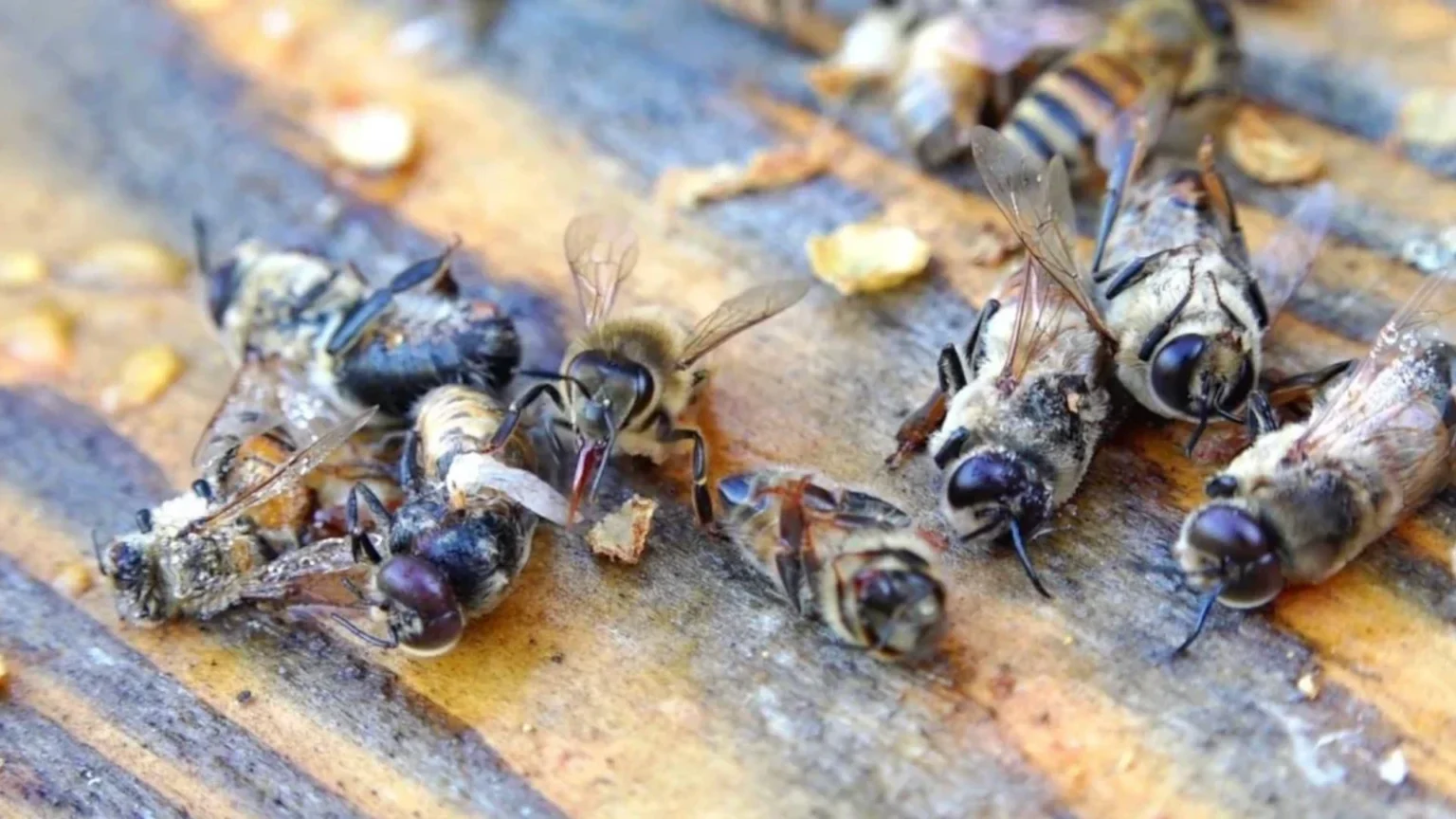Spring Clean Your Business – During October

Here in England, September and October see the long warm summer days receding into the memory. They are replaced by colder, wetter, windier days … which honey bees find challenging, to the point where it can kill them. So, this is the time of year when honey bees prepare for the long winter ahead. And it's a great time of year for business owners to do the same. It's why I recommend that you clean your business in October.
As you'll have seen elsewhere in the HoneyBee website, there are three types of honey bee:
-
The Queen
-
The Worker Bees
-
The Drones
What you may not know … all the worker bees are girls … and all the drones are boys.
The worker bees are the honey bees you will see in your garden, visiting the flowers and the trees. They collect nectar, pollen and water from wherever they can locate it, within a three mile radius of their hive - and they transport it back to their younger sisters in the hive, who process and store it. And of course, some of those resources are used to keep the bees alive … it's their food and drink.
In business terms - the worker bees bring in the money … some is used to keep the business alive … and the rest is 'invested' for the future … in particular for when times are tough. They literally "put money away for a rainy day".

The drones on the other hand, only do two things during their lives. They eat. And when required, they mate with a virgin queen and die as a result. Whilst they are vital for the long-term future of the colony, for the most part, drones are a constant drain upon the resources of the hive.
And that brings us back to the change in behaviour we beekeepers see as summer recedes into the past and autumn arrives.
The worker bees have spent all spring and summer working themselves to death (literally) bringing in the resources from far and wide - and storing as much as they can ahead of autumn and winter. In late summer and autumn, the queen is instructed not to lay so many eggs … so that the number of bees in the colony reduces from about 60,000 at its peak - to around 10,000 for the cold winter period. There are very few flowers around during the English winter and the weather is rainy and dangerous. Worker bees don't venture out of the hive very much and you don't see them in your garden during the wintertime. With almost no work to do over the winter - you don't need so many bees - in fact they want as few as possible … enough to huddle together to keep warm, but no more.
The girl workers consequently look at their drone brothers and they think ...
"Do we want boys eating our precious resources all winter?"
"Is that good for the colony?"
The objective answer is "No". Drones are a drain on resources and we girls cannot afford any unnecessary drain on resources. So, the girls evict the boys. They are literally pushed out of the hive. The drones starve and die.
Some might see this behaviour as brutal. But it is vital for the survival of the colony as a whole. And honey bees 'decide' what to do based upon what is good for the colony, not what is good for any individual. Reducing numbers, reducing the drain on resources, is vital for the survival of the colony - so that's what is done.
And in the spring, the queen will be instructed to lay more eggs (up to 1,000 a day at her busiest) so that numbers can be built up again. And she'll also be instructed to produce drones again, when needed. Unlike humans, a queen bee can produce a boy bee or a girl bee, as needed.
So, what has all this to do with you and your business?
I think all HoneyBee clients should spring clean your business in the autumn. I think you should follow the example of the honey bees. Review the situation. Decide what is needed and what is no longer needed. And take action for the good of the business. Get ready for winter now.
In short, I recommend you take the following six actions:
1. Deep Clean Your Books
The best place to start when you spring clean your business is the numbers. Have a thorough look at what pollen, nectar and water your worker bees have brought into your hive over the last six months or year. Compare those numbers to the previous six months or year. Note what worked, what was less successful and what could be improved. And look for 'drones to be evicted' … such as unnecessary subscriptions, things which were once useful but aren't needed right now.
Your business financials are at the heart of your business. They tell the story of what your bees have been doing - of what you have presided over as the beekeeper. And you can (should) use those historic numbers to predict what you want the future to be. Have you got enough pollen, nectar, water and honey in the bank to keep your bees alive throughout the coming six months and year?
How many bees do you need?
What will they be doing?
Why?
That's worth repeating … Why?

Answering those questions seems easy, but "can you see the wood for the trees?" Are you being totally objective about the numbers, or are you ignoring some hard truths, because it's easy to do so in your mind. Consider having a trusted outsider talk through the financials with you. Someone who has the future of the colony uppermost in their thinking. Perhaps a 1-2-1 with Bernie might prove fruitful?
In any event, thoroughly analysing your business financials and making objective, reasoned decisions, and taking action (sometimes with drone evicting brutality) will make the difference between your colony surviving or dying.

2. Polish Up Your Business Plan
As a consultant I see the 'back office' of many businesses. And far too many are guilty of the same thing. They spend a lot of time preparing a business plan … for a bank manager, or loan company, or whoever … and then they put the plan on the shelf and it gets forgotten. It's shelf-development, rather than self-development of the business. And ... the vast majority of those business owners feel guilty when we ask about it. Red faced guilty.
Your business sector is constantly changing and evolving. Your business needs to constantly change and develop to reflect the evolving world around it. Just like the honey bees in autumn, businesses need to contract and downsize when the future looks bleak and cold. Just like the honey bees in spring, businesses need to expand and venture outside when the future looks bright and warm. Whatever the weather is going to be - your business needs to change and evolve.
Therefore, your business plan needs to be an evolving work-in-progress. Set aside time to look at your deep cleaned books - and use that time to ask probing questions - to find objective, honest answers - and to create useful, effective, proactive plans for the coming weeks, months and years. Spring clean your business plan right now (and don't be afraid to get help).
3. Tidy Up Your Website
It's no secret that your small business website can help your business grow and evolve. But if you neglect your website, much needed changes fall through the cracks and your website can easily collect dust and damage your brand.
The chances are, your business has grown during the spring and summer, and in any event your business world is different today to what it was a year ago. You might have revised your mission. Maybe the law has changed for your business sector. Perhaps you've been thinking about a change of logo or colour scheme. Whatever the situation might be - you should take time to scour your website for things that are out of date, out of alignment with your business today, or just 'dusty'.
Perhaps start with a free website audit. (There are many available. I can recommend one.)
Maybe there is some content on your business website which needs to be re-written to better reflect your current business offerings. Maybe your website just looks dated. Maybe it just needs a little love. Fixing the little details (such as the CTAs) can have a huge impact on the effectiveness of your "website employee".


4. Freshen Up Your Marketing
Having thoroughly spruced up your numbers, revised and updated your business plan, and polished up your dusty website … the next task is to tell the world what you're doing. Just like your business plan, your marketing strategies need to be evolving too … more so in fact.
It's part of what I do for every consultancy client. Start by considering:
-
Analyse what marketing worked well and what was less effective over the last year.
-
Research new marketing trends and consider adopting new ways of messaging.
-
Send your messages automagically; for example email marketing?
-
Attend and/or exhibit at a trade show or conference.
-
Produce a marketing plan, reflecting the ambitions of your business plan.
Remember, it doesn't matter how wonderful you are at producing customer delight, if nobody knows.
So, Tell The World!
5. Organise Your Inbox (And Declutter)
As a busy bee running a hectic successful business, things like emails, paperwork, and other documents can quickly pile up. I've been there. We've all been there. And when you spring clean your business, this is an obvious action to be taken.
Start by using an uninterrupted hour (phone off, door shut, concentration on full power) to go through your email inbox. Yes, it can be painful. But it's worth it.
Go through all the emails which are weekly, monthly or regular subscriptions and newsletters. Do you read them? Or do they just clutter up your inbox. If they're the latter - unsubscribe. Channel your inner worker bee and evict those drone emails.
Whilst you're doing that - you'll come across stuff you should have done but haven't. Flag those emails - or move them into a "Must Be Done" folder. Don't deal with them during this uninterrupted hour, because you'll use up the hour doing the wrong stuff. Just identify them ready for later. Alongside your inbox, have a look at your digital filing (and your paper filing if you're old-school). Identify which files are no longer needed … highlight and "move to bin".
Anything that you're uncertain about because "it might be useful one day" … move into a folder marked "archive". If in the coming months you actually do need that file - move it out of archive and use it.

And next time you spring clean your business - start your digital declutter by highlighting the contents of your archive folder and then click "move to bin". If you didn't look at it in the last six months, you most likely never will.
Bin it!
Remember > Set aside a half day to deal with your new "Must Be Done" folder … and then make sure that's uninterrupted too, so you achieve what you need to achieve.

6. Declutter The Office
Some say this is the fun part. But I find it as difficult and painful as the digital "move to bin" because there's always the nagging thought that "it will be useful one day".
Take a deep breath. Roll up your sleeves. Take a swig of strong coffee - and literally clean the office. Give your office a really good clean. Some serious decluttering and cleaning around the office, will do your business some real good. After all, tossing out the trash, dusting the shelves and plants, and vacuuming never hurt anybody. Right?
Spring cleaning your workspace - both physical and digital - will make you feel refreshed and organised. Not only will your workspace look better, but you'll feel much better too, and you'll approach your work with a fresh 'spring in your step' too.
In Summary ...
Channelling your inner worker bee and evicting the drones in your business environment - alongside the six actions above - will spring clean your business before the end of October. You'll have cleaned out your hive, checked and assessed your nectar pollen and honey stores, and you'll have created a workable plan for the coming months. AND you'll have told your fellow bees and the world about your newly refreshed business. You'll get through the cold dark days of winter and you'll have a great head start for the warm brighter days of spring. You'll be buzzing with excitement and enthusiasm - and your business will be the better for it.
Do leave a comment or reply to let me know how you get on.
If you need help with your 'spring cleaning' or any aspect of it, consider the Business Health Check. It's a very thorough way of ensuring you identify problems in your business AND identify the actions required to move your business forward. Yes, there's a cost - but your business will make far more than that investment as a result of the changes and improvements which result. Click the button below to find out more.
